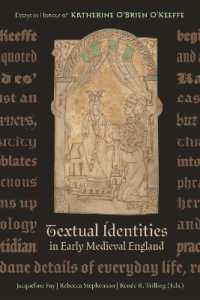- ホーム
- > 洋書
- > 英文書
- > Philosophy
Full Description
Jeffrey Bell offers a novel approach to thinking about a number of longstanding problems in metaphysics, issues that have persisted throughout the history of philosophy. By developing a metaphysics of problems, he shows how the history of both the analytic and continental traditions of philosophy can be seen to be an ongoing response to the problem of regresses. By highlighting this shared history, Bell brings these two traditions back together to address problems that have been essential to their projects all along and central to much of the history of philosophy.
Contents
Introduction
§1 Problem of the New
§2 Problem of Relations
§3 Problem of Emergence
§4 Problem of One and Many
§5 Plato and the Third Man Argument (TMA)
Plato's Theory of Forms
Vlastos on Third Man Argument
Gail Fine and the Imperfection Argument
The New and the Third Man Argument
The Imperfection Argument and Degrees of Being/Novelty
Problem of Becoming in Plato
Philebus and the Method of Mixture
Relative and Absolute Relations
§6 Bradley and the Problem of Relations
TMA and Regress
Bradley on Relations
Bradley Regress and TMA
Imperfection Argument and Bradley Regress
Relative and Absolute Relations (again)
§7 Moore, Russell, and the Birth of Analytic Philosophy
Birth of Analytic Philosophy
Moore on Bradley
Moorean Brute Facts and End to Regress
Russell on Bradley
Moore/Russell on Brute Facts
Defending Bradley
Michael Della Rocca on the Method of Intuition
Della Rocca's Spinozist Solution to the Problem of Relations
Method of Intuition and Analytic Philosophy of Time
Monism or Pluralism?
§8 Russell and Deleuze on Leibniz
Russell on the Task of Analysis (and on the taste of coffee)
Russell on Leibniz
Deleuze on Leibniz
Clear and Distinct/Confused and Obscure; or, on Differential Unconscious
§9 On Problematic Fields
Plato, Leibniz, and Problematic Fields
Problematic Fields and Field Theory
Bourdieu on Fields
Russell on Externality of Relations to Terms
Problematic Fields and Bourdieu's Fields contrasted
Austin and Performatives
Weimar Republic and November 20, 1923
Problematic Fields and External Circumstances
On Learning
Problematic Fields and Platonic Ideas
§10 Kant and Problematic Ideas
Kant and Plato
Infinity and Antinomies
Returning to Kant and Hume
Unity of Consciousness
Kant, Russell, and the Otherness of the Given
Kant, Infinite Regresses, and Infinite Tasks
Possible Experience and Real Experience
Kant's Left-Hand Paradox
Kant, Plato, and Frege
Kant and the Problematic Idea
§11 D.M. Armstrong and David Lewis on Problem of One and Many
Kant's Transcendental Illusion
Frege and the Third Man Argument
Armstrong on Universals
Lewis on Universals and Natural Properties
Classes and Individuals
The Trouble with Singletons
Lewis and Regresses
Natural Properties and Humean Supervenience
Primacy of the Determinate
Philebus and Lewis
Problematic Ideas as Non-Mereological Part of Determinate
§12 Determinables and Determinates
Problem of Emergence
Jessica Wilson and Fundamental Determinables
Wilson and Deleuze
Uexküll's ticks
Metaphysical Indeterminacy and the Primacy of the Determinate
Determinables and Problematic Ideas
§13 The Limits of Representational Thought
Predicates as Determinates or Determinables?
Mark Wilson on Predicates
Hasok Chang on Inventing Temperature
Mark Wilson on Theory Façades
Husserl and the 'constitutive becoming of the world'
Husserl and American neo-realism; or, Hook and Nagel invent Analytic Philosophy
Heidegger, Carnap, and the Purification of Everyday Language
Husserl's Humean Phenomenology
Husserl and Regress of Consciousness
Husserl and Problem of Singletons
Husserl and Lebensphilosophie
Problematic Ideas and Singletons
Deleuze's Transcendental Empiricism
§14 Learning from a Cup of Coffee
Mark Wilson, Temperature, and Theory Façades
Transcendental Empiricism and Real Experience
Adorno's Negative Dialectics
Adorno's non-conceptual objectivity
Ethnomethodology and the Taste of Coffee
Objectivity and Problematic Ideas
§15 Carnap and the Fate of Metaphysics
Carnap's "Elimination of Metaphysics"
Regresses and Logical Analysis
Wilfrid Sellars and the Myth of the Given
McDowell and World-Disclosing Experience
Dreyfus on McDowell; or, on non-conceptual experience
McDowell replies, and Jason Stanley on Skill
MacFarlane on McDowell; or,
the Problem of Mathematical Experience
Lewis and Singletons, again
Meillassoux, Contingency, and Mathematics
Huw Price, Pragmatic Relevance, and the Fate of Metaphysics
Monism or Pluralism?
§16 Truth and Relevance
Arbitrary Accounts and Infinite Regresses
Brute Facts or Spinozist Bullet?
Davidson's Coherence Theory of Truth
Davidson on Language
Problematic Ideas; or, Pluralism = Monism
Problematic Ideas and the Relevance of the Determinate
Living the Problem; or, the inescapable social field
Meillassoux and the primacy of the determinate
Towards a Humean Political Theory
Conclusion
Bibliography








